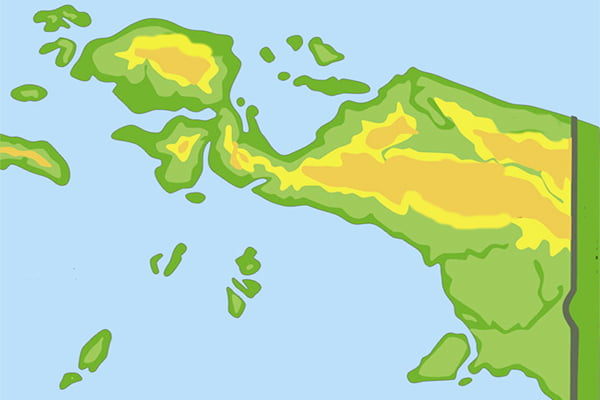The Government is Committed to Accelerating Development for the Progress of Papua
For decades, Papua has still struggled with classic problems, namely welfare. Various efforts have continued to be made, including providing Special Autonomy (Otsus) funds for decades. However, the welfare of the Papuan people is still not equal to other regions.
The Indonesian government under the leadership of President Joko Widodo (Jokowi) has paid special attention to development in Papua, with the main aim of improving the welfare of the Papuan people, one of which is building strong infrastructure.
So far, logistics costs in Papua have been expensive because they have to be carried out by air which is certainly not cheap. Apart from that, access to the provincial government which is quite far away makes community administration services, especially in remote areas, quite difficult. Therefore, the government has taken major steps in building a better transportation network, including the construction of roads, bridges, ports and airports. Adequate infrastructure will open access to remote areas, overcome isolation, and facilitate the mobility of people and goods.
President Joko Widodo has highlighted the great potential of Papua Province in his latest meeting which discussed the evaluation of the implementation of National Strategic Projects and Priority Programs in Papua Province. This region, which has the largest area, is also known for its abundant natural wealth potential, including the mining, agriculture, forestry, as well as maritime and fisheries sectors.
Papua, as a province located at the eastern tip of Indonesia, has unique challenges and opportunities. With its vast territory and abundant natural resources, there is a lot of work that needs to be done to encourage economic growth and equitable development in this region. This includes efforts to develop isolated areas and develop border areas.
President Jokowi views accelerating infrastructure development as the key to driving the economy and realizing equitable development in Papua. This includes the construction of airports, ports, roads, and bridges. With better infrastructure, all regions in Papua can be well connected, overcome isolation, and facilitate connectivity between regions, districts and regions.
Through the government’s commitment to optimizing Papua’s natural potential and improving infrastructure, it is hoped that development in this region will become more inclusive and sustainable. This is a positive step in supporting the government’s vision to improve the quality of life of the Papuan people and develop the full potential of this region so that it becomes the main driver of national development.
Since the publication of Presidential Instruction Number 9 of 2017, accelerating the development of Papua and West Papua has increasingly become the focus of the Indonesian Government. Increasing access and quality of basic services as well as economic development through the downstreaming of superior commodities continues to be carried out.
The instructions outline seven efforts to accelerate development and welfare of the people in Papua, namely (1) a development approach based on culture, customary areas, and a focus on OAP; (2) frontier (border), remote and underdeveloped areas (inland and mountainous areas); (3) a dialogue approach with all stakeholders; (4) assistance to local government officials and the community through material guidance/short training on planning using the THIS concept; (5) empowerment and active involvement of local communities; (6) empowering OAP entrepreneurs and local entrepreneurs through the issuance of Presidential Regulation Number 17 of 2019; and (7) partnership cooperation with international development partners, communities, community organizations, non-governmental organizations, the private sector and other stakeholders through mapping the operations and work of development partners.
From the various efforts that have been made, at a macro level, development achievements in the Provinces of Papua and West Papua have improved, which can be seen, among other things, from the improvement in the Human Development Index (HDI), improvement in Gross Regional Domestic Product (GRDP), and the decline in poverty rates. and open unemployment, according to data from the Central Statistics Agency. Macro development achievements are also supported by intensive integrated sectoral development.
The focus on Papuan development was also mentioned by the Coordinating Minister for Human Development and Indonesian Culture (Menko PMK), Muhadjir Effendy, where he emphasized that the central government has special attention to Papua. Development of infrastructure, health and education will be pursued gradually so that Papuan human resources are able to compete with other regions.
Meanwhile, the Vice President, Ma’ruf Amin, said that in the Special Autonomy mandate there was a policy for the expansion of New Autonomous Regions (DOB). The policy of establishing new regions is to address the span of control between the government and the community. Considering that Papua has a very large area and complex problems. DOB will later make education, health, governance as well as human resource and infrastructure development better.
Efforts to open access and improve welfare, including a commitment to providing positive news in Papua are very important steps in supporting the government’s vision to create a greater Indonesia. Papua, with its unique natural and cultural riches, has great potential to become one of the driving forces for this country’s progress. In order to achieve this goal, collaboration and cooperation from all parties will be the key to success.
